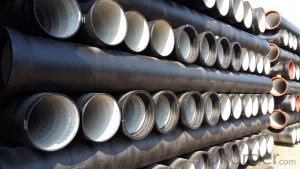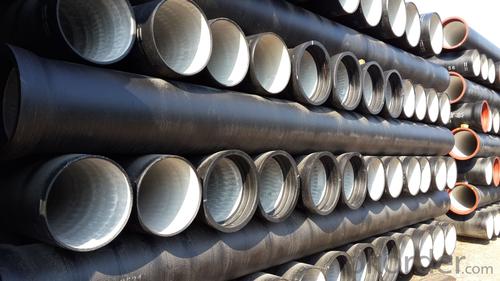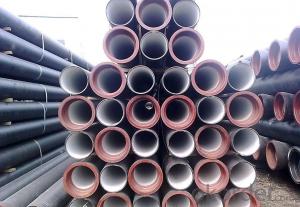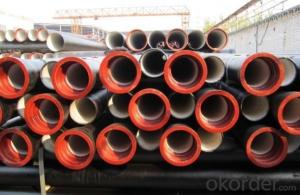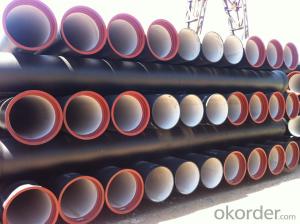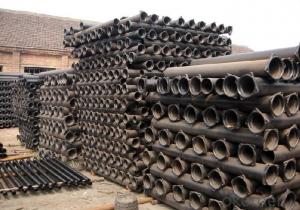Ductile Iron Pipe of China On Sale DN100-DN500 EN545
- Loading Port:
- China main port
- Payment Terms:
- TT or LC
- Min Order Qty:
- 20 m.t.
- Supply Capability:
- 50000 m.t./month
OKorder Service Pledge
OKorder Financial Service
You Might Also Like
1,Ductile Iron Pipe Description :
1) Pipes confirm to ISO2531,K9 class,T type joint,6m long,with inside cements lining conform to ISO4179,
outside Zinc spraying(130g/m2) and bitumen coating(70μm) conform to ISO8179.
2) Pipe ends: Spigot and socket ends, with 100% SBR rubber gaskets accoding to ISO4633
3) we can do third party inspection according to customer's request.
4) Our products have been sold to many international market,such as Middle East and South East Asia and Africa.
2,Main Features of the Ductile Iron Pipe:
1. Material: Ductile iron grade 500-7/ 450-10 in accordance with ISO1083
2. Standard: ISO 2531, EN545, EN598, ANSI, AWWA
3. Certificate: ISO9001, ISO14001, SGS, NSF, WRAS
4. Test: In accordance with ISO 2531 / EN 545 / EN598 and 100% water pressure test
5. Length: 6m or cut into 5.6m, 5.7m, 5.8m
3,Ductile Iron Pipe Images:
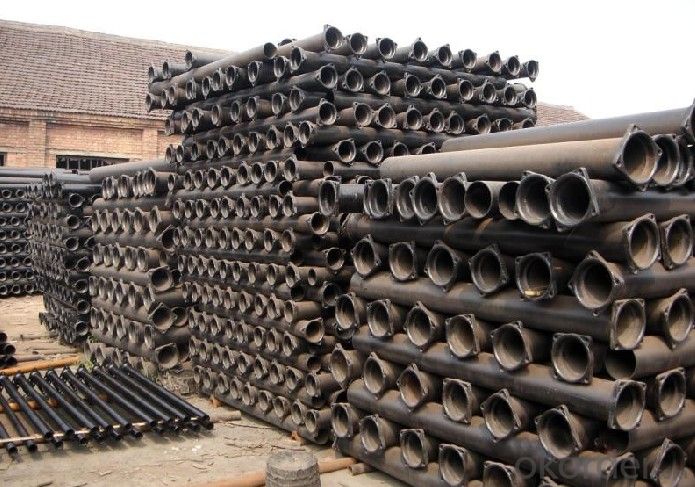
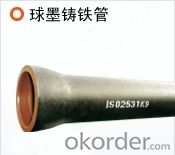
4. Ductile Iron Pipe Specification
Quick Details
Place of Origin: China (Mainland)
Model Number: DN80-1600 Length: 6M/5.7M/NEGOTIATED Standard: ISO2531 / EN545
Application: Potable/Sewage Water
Diameter: DN80-1600
Shape: Round
Hardness: 230 Pipe
Wall Thickness: standerd
Pull Strength: 420
Yield (≥ MPa): 300
Material: Ductile Iron water ductile iron pipe: SO2531 / EN545 DI pipe
Packaging & Delivery
Delivery Detail: 30-45 days
ductile iron pipe:
1. DN80-DN1600mm (T-Type, Class K9)
2.effective length 6m/pc
3.comply with ISO2531/EN545/EN598
5.FAQ:
We have organized several common questions for our clients,may help you sincerely:
1.Q: Why would you choose ductile iron pipe rather than other pipe materials?
A:The reasons are obvious for that not only ductile iron pipe possesses the inherent strength and flexibility of ductile iron, combined with proven corrosion protection systems, but also the cost savings can be achieved from design to installation and commissioning.
2.Q:Why can you guarantee the inner of pipes can’t be corroded?
A: High alumina cement mortar lining and sulphate-resistant cement mortar lining. These two special linings are applicable to inner anti-corrosion for sewage pipes, improving resistance to erosion of the sewage components.
- Q: How do ductile iron pipes handle pressure surges in pumping stations?
- Ductile iron pipes are known for their strength and durability, making them well-equipped to handle pressure surges in pumping stations. These pipes have a high resistance to impact and are designed to withstand the sudden increase in pressure that occurs during surge events. Additionally, their flexible nature allows them to absorb and distribute the force exerted by the surge, minimizing the risk of pipe failure or damage. Overall, ductile iron pipes are a reliable choice for handling pressure surges in pumping stations.
- Q: Are ductile iron pipes resistant to soil movement?
- Indeed, soil movement poses no threat to ductile iron pipes. These pipes boast an impressive tensile strength, enabling them to withstand external forces like soil movement. Specifically engineered for flexibility, they possess the ability to absorb and distribute stresses stemming from ground settlement or other soil movements. Moreover, their robust construction allows them to resist the compressive forces exerted by the surrounding soil. Consequently, ductile iron pipes represent a dependable and enduring option for underground pipelines, ensuring long-term stability and safeguarding against soil movement.
- Q: Are ductile iron pipes resistant to acid attacks?
- Yes, ductile iron pipes are generally resistant to acid attacks. Ductile iron is a type of cast iron that has been treated with magnesium to improve its strength and ductility. This treatment creates a more resistant material that can withstand corrosive environments, including acids. However, it is important to note that the level of resistance may vary depending on the specific acid and concentration involved. In highly corrosive environments, such as those with strong acids or high concentrations, additional protective measures such as lining or coating the pipes may be necessary. Additionally, regular inspection and maintenance are also important to ensure the long-term durability and resistance of ductile iron pipes.
- Q: Can ductile iron pipes be used for water tunnel crossings?
- Indeed, water tunnel crossings can utilize ductile iron pipes. Renowned for their robustness, longevity, and immunity to corrosion, ductile iron pipes prove to be an ideal option for diverse purposes, including water tunnel crossings. Their ability to endure immense pressure, external burdens, and soil movements, commonly experienced in tunnel crossings, is commendable. Moreover, ductile iron pipes boast an extended lifespan and necessitate minimal upkeep, rendering them an economical resolution for water tunnel crossings.
- Q: Are ductile iron pipes suitable for use in irrigation sprinkler systems?
- Yes, ductile iron pipes are suitable for use in irrigation sprinkler systems. Ductile iron pipes are known for their durability, strength, and corrosion resistance, making them an ideal choice for various applications, including irrigation systems. These pipes have a high tensile strength and can withstand high pressure and heavy loads, which is essential for maintaining a consistent water supply to sprinkler systems. Additionally, ductile iron pipes have a long lifespan, reducing the need for frequent maintenance and replacement, making them a cost-effective option for irrigation systems. Overall, ductile iron pipes are a reliable and suitable choice for use in irrigation sprinkler systems.
- Q: Are ductile iron pipes suitable for trenchless installation methods?
- Yes, ductile iron pipes are suitable for trenchless installation methods. Ductile iron pipes are known for their strength, durability, and flexibility, making them ideal for trenchless installation methods such as horizontal directional drilling (HDD) and pipe bursting. HDD involves drilling a small pilot hole underground and then pulling the ductile iron pipe through the hole, without the need for extensive trenching. Ductile iron pipes can withstand the pulling forces exerted during this process and can be easily guided through the underground path. Pipe bursting is another trenchless method where an existing pipe is replaced by breaking it apart while simultaneously pulling a new ductile iron pipe into place. The strength and flexibility of ductile iron pipes allow them to withstand the force required to burst the existing pipe and replace it with minimal disruption to the surrounding area. In both these trenchless installation methods, ductile iron pipes offer several advantages. They have a high resistance to corrosion and can withstand high-pressure applications, making them suitable for a wide range of underground environments. Ductile iron pipes also have a long service life, reducing the need for frequent replacement and maintenance. Overall, ductile iron pipes are a reliable and suitable choice for trenchless installation methods, providing efficient and cost-effective solutions for underground pipe installations.
- Q: Can ductile iron pipe be used for compressed air systems?
- Yes, ductile iron pipe can be used for compressed air systems. Ductile iron is known for its durability and high strength, making it suitable for handling the pressure requirements of compressed air systems. However, it is important to consider factors such as pipe sizing, pressure ratings, and compatibility with other system components to ensure safe and efficient operation.
- Q: What are the different lining thickness options for ductile iron pipe?
- The specific application and project requirements typically dictate the various options for lining thickness in ductile iron pipes. Cement mortar lining, polyurethane lining, and polyethylene lining are among the most commonly used options. Cement mortar lining, which is widely employed in ductile iron pipes, involves the application of a layer of cement mortar on the inner surface of the pipe. This lining provides corrosion protection and enhances the hydraulic performance of the pipe. The thickness of cement mortar lining can vary from 3mm to 6mm. Polyurethane lining, another popular choice, is particularly suitable for applications requiring resistance to abrasion and chemical attack. It is usually applied using a spray or casting method, and the thickness can vary depending on project specifications. Typically, polyurethane linings range from 1mm to 4mm in thickness. Polyethylene lining, a relatively newer technology, is commonly used in applications where chemical corrosion resistance is crucial. The lining is applied using a rotational lining process, wherein a layer of molten polyethylene is evenly distributed on the internal surface of the pipe. The thickness of polyethylene lining can range from 2mm to 8mm, depending on project requirements. It is worth noting that the lining thickness can be tailored to meet specific project needs, including the corrosiveness of the transported fluid, operating conditions, and desired service life of the pipe. Consulting with a qualified engineer or pipe manufacturer is advisable to determine the most suitable lining thickness for a given application.
- Q: What does ductile iron pipe "K" mean?
- 1 、 pipe fittings are K type, T type, etc.;2 wall thickness registration symbol. For example, according to the pipe quality standards GB/T13295-K9, which is the wall thickness ofK=9* (DN/1000+0.5)
- Q: Can ductile iron pipes be used in earthquake-prone areas?
- Yes, ductile iron pipes can be used in earthquake-prone areas. Ductile iron is a flexible and durable material that can withstand seismic activity and ground movements. It has been tested and proven to have high resistance against earthquakes, making it a suitable choice for infrastructure in earthquake-prone regions.
Send your message to us
Ductile Iron Pipe of China On Sale DN100-DN500 EN545
- Loading Port:
- China main port
- Payment Terms:
- TT or LC
- Min Order Qty:
- 20 m.t.
- Supply Capability:
- 50000 m.t./month
OKorder Service Pledge
OKorder Financial Service
Similar products
Hot products
Hot Searches
Related keywords
